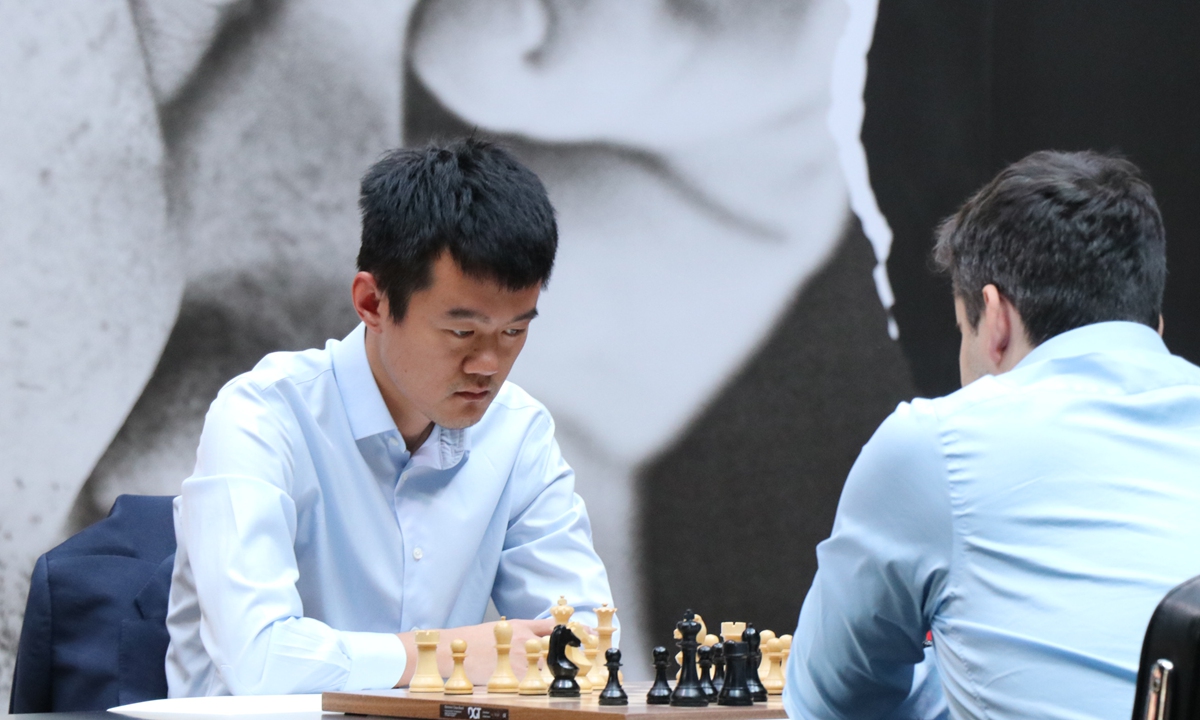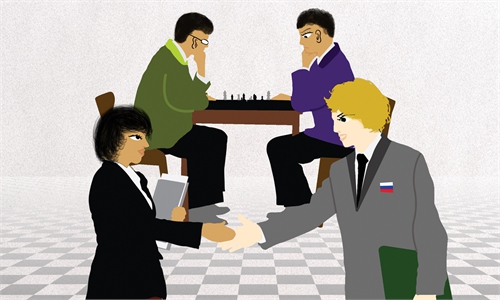ARTS / CULTURE & LEISURE
New world chess champion Ding Liren captures people's hearts

Chinese chess player Ding Liren defeats Ian Nepomniachtchi of Russia at the World Chess Championship in Astana, Kazakhstan on April 30, 2023. Photo: VCG
Please allow me to start the story in an unconventional way: I am going to tell you about my own experience.
When I was in Madrid during the Candidates Tournament, the event that would decide who would ultimately compete for the title of world chess champion, I was asking the workers of the palace where the competition was being held and who was their favorite chess player. Everyone told me the same thing: "The Chinese player!"
In such a Western setting, it might have made sense that the staff's affections would have turned toward a more culturally relatable player, but the humble nature of the Eastern talent has made him a favorite of everyone.
I have the pleasure of getting to know Ding Liren since I interviewed him in Mallorca, Spain. My heart has filled with joy to see that, over the years that young man has continued to preserve his wonderful qualities.
In the post-game after becoming the new Chess World Champion, he left everyone breathless by stating, "I know myself, I will cry and burst into tears... That match reflected the deepest parts of my soul."
This is Ding Liren, our new world chess champion.
Who is Ding?
Born in Wenzhou, East China's Zhejiang Province in 1992, Ding retains his youthful charm with a benevolent smile, an innocent gaze and a tranquil voice, endearing him to chess enthusiasts worldwide.
Over the past few weeks, he has ascended to the summit of the chess world in Astana, Kazakhstan, driven by his goal to secure China its first-ever absolute world chess championship. The 30-year-old arrived at the event balancing his youthful exuberance with the wisdom of experience. His formidable opponent, the equally powerful Ian Nepomniachtchi of Russia, was making another attempt at the world title.
For the chess aficionado, this has been a frenetic duel of opposing styles: The positional game of control from Ding versus the tactical calculation-based play of the Russian. Although the championship began on a sour note for Ding, he refused to yield in the face of adversity, took infinite risks, equalized the score and eventually emerged victorious.
This achievement reminds me of an anecdote involving Ding himself, in which he revealed his deep aversion to losing, "I suffer a lot when I lose."
Even when faced with a serious injury, such as the hip fracture he suffered during an event in Norway a few years ago, Ding remained steadfast in his professional duties, only seeking medical attention after fulfilling his commitments while filming a TV show.
Remarkably, he soon led the Chinese team to victory in the 2018 Chess Olympiad championship, even on crutches and despite the immense physical exertion required after surgery.
In short, Ding's latest achievement has cemented his status as a brilliant and beloved chess player, capturing the hearts and admiration of the chess community around the world.
China in chess
I remember, at the beginning of the 1990s, telling my acquaintances that the future of chess was in China. Many laughed, because the results of the nation on the international scene were not outstanding.
However, one only had to take a look at the rankings of the age world championships to understand that things had changed: Chinese girls began to take the top positions and soon after, Chinese boys followed suit.
Today, to say "chess" in the world is to say "China." For this reason, it is no coincidence that the unstoppable development of China in chess has been parallel to its economic development.
It is no coincidence that the best active female player in the world is Hou Yifan, along with current world champion is Ju Wenjun and her challenger is Lei Tingjie (the two will play in Shanghai and Chongqing in July). They have more than enough reason to be proud of their progress in chess, with seven Chinese female players in the world top 50.
What, then, are the keys to the development and strength of chess in China? In my opinion, it is the fact that since the 1980s it has been following a plan whose first objective was to achieve success in the women's world championships, and then follow with increasingly ambitious goals.
Xie Jun led the way in 1991 and since then the following Chinese chess players have won the world title for their nation: Zhu Chen, Xu Yuhua, Hou Yifan, Tan Zhongyi and Ju Wenjun. Six of the last 11 world female champions are Chinese!
Another example of this is China's success in the Chess Olympiads, the main team competition. China has won two of the last five editions. Its model of success, training in the youth, contrasts with the model chosen by the US. The result? A championship in 2018. In the female competitions, China has won seven of the last 12 editions, while the US has never won.

Photo: VCG
The West loves DingI am pleased to tell you openly that the West, and especially Spain, has fallen in love with Ding, that our social networks are filled with messages of support for the Chinese talent whenever he loses and explosions of joy when he wins.
This does not mean that his formidable rival is disliked, as Nepomniachtchi also has many followers and a gentlemanly demeanor.
What I want to convey is that, beyond other considerations, the Chinese superstar is well loved for the human values he represents: truly humble, oblivious to the luxuries of money, familiar, with excellent manners, kindly shyness and immaculate honor in the exercise of his profession.
The author is a Spanish writer and editor-in-chief of the chess magazine Peón de Rey. He also collaborates with the Global Times writing about international politics.


